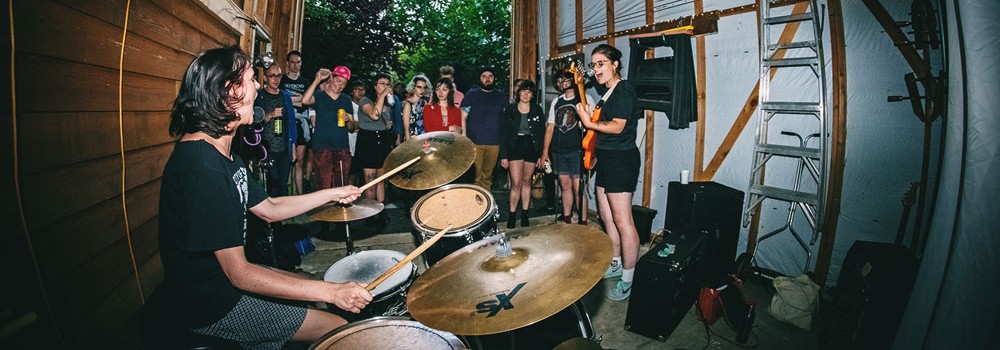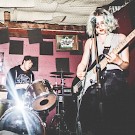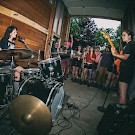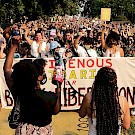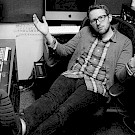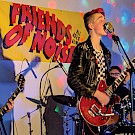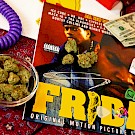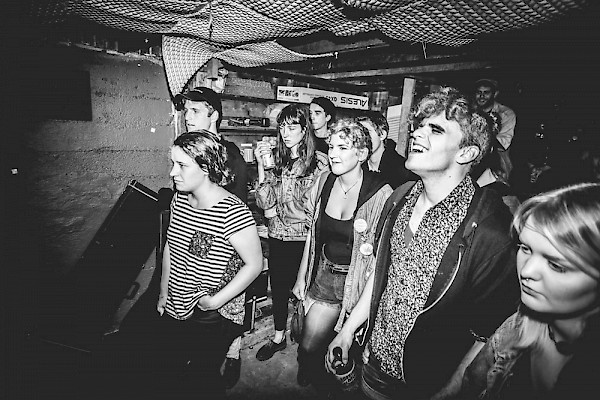 An all-ages crowd rocks out to Naked Hour at the basement space My Friend Ben Scott's House on June 9—click to see a whole gallery of photos by Sam GehrkeI walk up to a two-story building on NE Broadway on a cool May evening where a group of people are huddled around an unmarked door—one that, without the tall blond man collecting donations, would most likely be assumed inaccessible, an emergency exit or an out-of-sight area for retail employees to smoke on break. The donation collector is Eddie Charlton, 30, guitarist and vocalist of Portland shoegaze-pop band Lubec and the newest member of the Semi-OK Collective zine’s editorial staff. The donations are partly for the performing musicians and partly for the fourth issue of Semi-OK, a project started by Claire Gunville, 20, and Teal Bluestone, 21, in the summer of 2015 to document their fellow artist friends involved in the DIY Portland music community.
An all-ages crowd rocks out to Naked Hour at the basement space My Friend Ben Scott's House on June 9—click to see a whole gallery of photos by Sam GehrkeI walk up to a two-story building on NE Broadway on a cool May evening where a group of people are huddled around an unmarked door—one that, without the tall blond man collecting donations, would most likely be assumed inaccessible, an emergency exit or an out-of-sight area for retail employees to smoke on break. The donation collector is Eddie Charlton, 30, guitarist and vocalist of Portland shoegaze-pop band Lubec and the newest member of the Semi-OK Collective zine’s editorial staff. The donations are partly for the performing musicians and partly for the fourth issue of Semi-OK, a project started by Claire Gunville, 20, and Teal Bluestone, 21, in the summer of 2015 to document their fellow artist friends involved in the DIY Portland music community.
The event itself is upstairs in the nontraditional venue space Claire’s Studio, which, as the name implies, is where Gunville creates her artwork. Inside, there are paintings and photos hanging on the walls and a projector screening old episodes of The Powerpuff Girls. I’m sweating from the heat of dozens of bodies gathered to see local bands Boreen, Naked Hour (Bluestone’s project where she sings and plays bass) and Snow Roller. No alcohol is sold and the median age of attendees looks to be around 21.
By now, it’s been acknowledged that there’s a severe lack of spaces in Portland dedicated to all-ages music, with venues like Laughing Horse Books, Slabtown and Backspace shutting down in the past couple of years due in part to rising rents and/or strict liquor control laws (depending on who you ask). At long last, this has become an issue that cannot be ignored, even by older generations of Portlanders in the city’s music community. In May, Friends of Noise—an all-ages advocacy nonprofit run by an adult board of directors as well as a committee of Portland-area youth with hopes to ultimately start a new venue—held its launch party. (Check out a gallery of photos from that event.) With the group’s emergence, the challenge of hosting all-ages shows became a publicized discussion thread as Friends of Noise received coverage from many of the city’s local media outlets.
However, for groups like Semi-OK and those under 21 in Portland, finding places to host and enjoy live music has been an ongoing struggle, often fought by implementing creative solutions and being opportunistic with available spaces. In addition to more consistent all-ages venues (like Anarres Infoshop and Black Water Bar), organizers have utilized spaces that are less often considered traditional venues, like the recent queer musicians mini-fest at Sweetpea Baking Company, the Foster-Powell skate shop SMART Collective, Mother Foucault’s Bookshop, or the countless house venues that continuously emerge and dissolve.
While calling attention to all-ages access to music in Portland is dearly needed, it seems disingenuous to center the conversation around Friends of Noise, a group that aims to put on four events in total during its inaugural year. This effort is helpful, but not quite an accurate representation of the current all-ages landscape—and not nearly enough to make a significant impact. As I finish this article, I will have just turned 21 after living and attending shows in Portland since I moved to this city for college nearly two years ago. In those years, I’ve met many young bookers and tireless advocates of all-ages music who have been working to put on shows while largely being excluded from the public conversation.
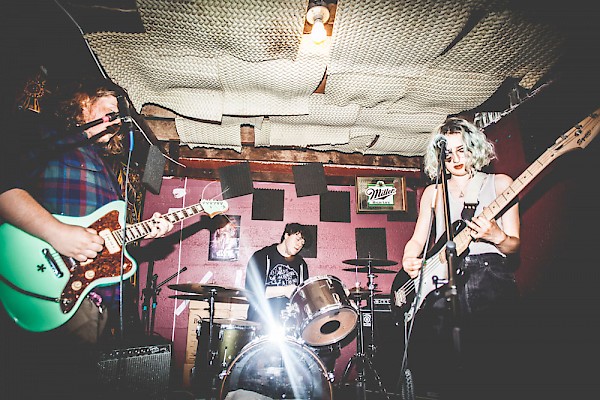 Naked Hour featuring Semi-OK Collective’s Teal Bluestone on vocals and bass (right) rocking My Friend Ben Scott’s House on June 9—click to see more photos by Sam GehrkeI was first introduced to the Semi-OK Collective in the spring of 2015 after attending a show at the basement space My Friend Ben Scott’s House, home to Portland post-hardcore band Sioux Falls. This was a few months before Claire Gunville and Teal Bluestone came out with the first issue of their zine, which they have since followed with three additional issues, accompanying mixtapes, and several local music showcases. While Gunville typically handles the design portion of the zine, Bluestone plays a large part in booking the artists and musicians who perform at the Semi-OK-curated shows, a skill she developed as a teenager in bands and with the local nonprofit Music in the Schools.
Naked Hour featuring Semi-OK Collective’s Teal Bluestone on vocals and bass (right) rocking My Friend Ben Scott’s House on June 9—click to see more photos by Sam GehrkeI was first introduced to the Semi-OK Collective in the spring of 2015 after attending a show at the basement space My Friend Ben Scott’s House, home to Portland post-hardcore band Sioux Falls. This was a few months before Claire Gunville and Teal Bluestone came out with the first issue of their zine, which they have since followed with three additional issues, accompanying mixtapes, and several local music showcases. While Gunville typically handles the design portion of the zine, Bluestone plays a large part in booking the artists and musicians who perform at the Semi-OK-curated shows, a skill she developed as a teenager in bands and with the local nonprofit Music in the Schools.
“I started planning shows when I was about 15. My parents are both professional musicians and they opened up their house in Beaverton [to host shows], so they were very supportive of my want to do music,” Bluestone recalls. “Teenagers need to have shows and spaces to get away from the bullshit they’re dealing with. I would cry if I only had one show per season. What would I do with my life?”
I meet with Semi-OK’s editorial staff, Gunville, Bluestone and Charlton, a few weeks after their issue release party, which by all accounts was a resounding success—so much so that the group are currently seeking nonprofit status to enable more frequent events in larger, more established spaces. The three seem to share a strong sense of optimism. Admittedly, it seems one needs to have at least some degree of hope to function in the DIY world.
“We had a great setup [for our last show]. A ton of people want to be putting on shows but don’t have access to that stuff, and I think we should be trying to help them in more of a friendly way,” Gunville says. “I think a lot of what Semi-OK is about is knowing that it’s okay to be amateur. Because we’re all semi-okay at what we do, but we are all stumbling together.”
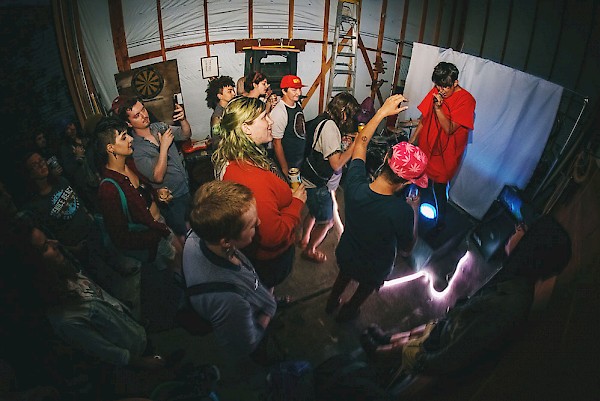 HURTR at a pop-up house show on June 29—click to see more photos by Autumn AndelIn the winter of 2015, Semi-OK began as the Facebook group PDX Semi-OK Shows created by Sioux Falls. Consisting of like-minded friends in bands, it was a tool to easily share information about upcoming shows. Now, the community is expanding (the Facebook group is approaching 500 members) and things are quickly changing as some bands see greater coverage in national media outlets. Yet in Portland, the issue of space (or lack thereof) remains basically the same.
HURTR at a pop-up house show on June 29—click to see more photos by Autumn AndelIn the winter of 2015, Semi-OK began as the Facebook group PDX Semi-OK Shows created by Sioux Falls. Consisting of like-minded friends in bands, it was a tool to easily share information about upcoming shows. Now, the community is expanding (the Facebook group is approaching 500 members) and things are quickly changing as some bands see greater coverage in national media outlets. Yet in Portland, the issue of space (or lack thereof) remains basically the same.
Performance spaces are inconsistent in the all-ages DIY community. Such is the nature of nontraditional venues, as formerly bustling spots are shut down either by noise complaints or rising rents and development. Da Floretta Lamv, 22, is in the musical project Dreams and used to run the house show and art space Planet Castle, which at its peak was home to 11 artists who hosted weekend shows with local musicians and monthly touring acts. Planet Castle, like many other Portland houses, can no longer host shows as the landlord demolished the home last year.
“I’m sort of coming to terms that spaces will flourish and then they will be destroyed by capitalism,” Lamv says.
“I think it is a complex problem and that there are a probably a lot of ways to enable an all-ages community,” Charlton says. “It is important to be better at connecting people with resources, to people who are already working within the community. It would not only help solve the problem, but it would also perhaps make existing communities [and events] more visible to people [outside of a student booker’s friend group]. I say find the kid in high school who’s already booking shows and just offer them your resources.”
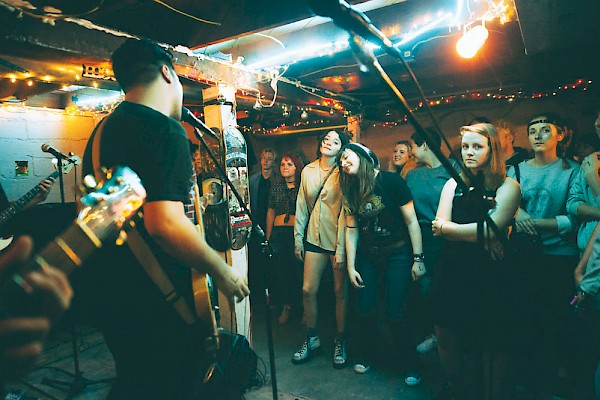 Scrambling to find a venue last mintue, teenage booker Delaney Motter organized a five-band bill (featuring Get Married) at the SW Portland basement space The Leak on July 10—click to read the story of Trevor Will's shotThis thought really stuck with me and called to mind Delaney Motter, 18, a University of Oregon freshman who graduated high school a year early, but not before taking on a senior project centered on booking all-ages shows in Portland. Motter started at the late Slabtown under the mentorship of owner Doug Rogers. After the venue’s sudden closure in October 2014, she continued on her own, hosting two benefit shows for SE Foster skate shop and sometimes venue SMART Collective. Now, despite having moved to Eugene for college, Motter has continued her booking and advocacy for local, all-ages music by coming back home to Portland and booking shows nearly every weekend.
Scrambling to find a venue last mintue, teenage booker Delaney Motter organized a five-band bill (featuring Get Married) at the SW Portland basement space The Leak on July 10—click to read the story of Trevor Will's shotThis thought really stuck with me and called to mind Delaney Motter, 18, a University of Oregon freshman who graduated high school a year early, but not before taking on a senior project centered on booking all-ages shows in Portland. Motter started at the late Slabtown under the mentorship of owner Doug Rogers. After the venue’s sudden closure in October 2014, she continued on her own, hosting two benefit shows for SE Foster skate shop and sometimes venue SMART Collective. Now, despite having moved to Eugene for college, Motter has continued her booking and advocacy for local, all-ages music by coming back home to Portland and booking shows nearly every weekend.
Upon meeting Motter, I immediately notice her hands marked with two giant magic marker Xs, a telltale indicator of an under-21 concertgoer. Motter books shows while going to college full-time and working part-time, and when I ask her how she’s managed this, she looks at me like a relative asking what her major is at Thanksgiving (which, for good measure, is journalism).
“I like to be busy, so it’s really good for me. When I started school in Eugene last fall, it was weird for me not to be booking shows so frequently. I got into a weird depression and it wasn’t good,” Motter says. “Then after winter break, my family and I recognized that it was really important for me to be able to come back home regularly, so since January I’ve been up here every weekend booking and going to shows.”
Motter’s passion for all-ages advocacy takes a slightly different form than others in the Portland music community. Hers is a unique, uncompromising idealism that can be seen as empowering or abrasive depending on where you’re viewing it from. While most people in all-ages discussions are willing to acknowledge the value of having all-ages spaces, not many seem to outwardly oppose any show that is 21 and over.
“I’m pretty openly anti-21-plus, because people should not be denied access to art,” Motter says. “I say that fully knowing that people aren’t going to listen and totally change and stop playing 21-plus shows. I say that to start a conversation, and to make sure people are at least thinking about all-ages music more seriously.”
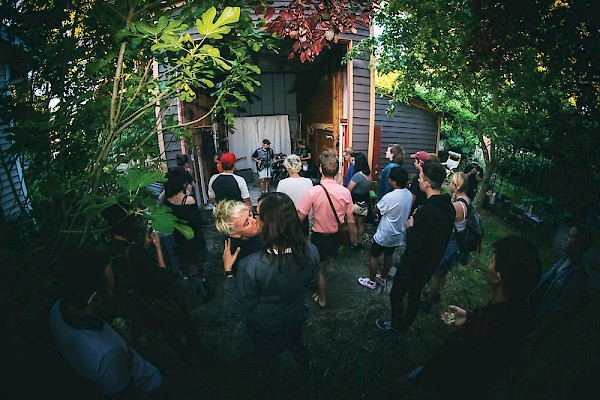 Drunken Palms at a pop-up house show on June 29—click to see more photos by Autumn AndelThis passionate sentiment has me smiling. It’s a familiar feeling, to be young and feel as though adults deem you helpless, inexperienced or less serious. I’m left thinking that more people with strong stances like Motter should be heard and recognized because 21-plus shows have become the norm, and the venues that host these shows are not compromising unless a band like Thee Oh Sees or Quasi seek to play an early set in addition to their normal late-night show. We get to talking about the recent coverage of Friends of Noise and Motter is forthright with her discontent.
Drunken Palms at a pop-up house show on June 29—click to see more photos by Autumn AndelThis passionate sentiment has me smiling. It’s a familiar feeling, to be young and feel as though adults deem you helpless, inexperienced or less serious. I’m left thinking that more people with strong stances like Motter should be heard and recognized because 21-plus shows have become the norm, and the venues that host these shows are not compromising unless a band like Thee Oh Sees or Quasi seek to play an early set in addition to their normal late-night show. We get to talking about the recent coverage of Friends of Noise and Motter is forthright with her discontent.
“The Oregonian article sort of made it out to be that Friends of Noise is here to save all ages, but that’s not true. We’re here, we’re alive, we’re struggling,” Motter says. “I’d hardly even heard of [Friends of Noise] before the articles came out. They haven’t been working with us.”
While I believe Friends of Noise is well intentioned and likely a net positive force for all-ages music, Motter is not alone in her frustration—and this frustration is totally valid. Friends of Noise had feature-length articles in both of Portland’s alternative weeklies as well as Portland Monthly and The Oregonian. Simultaneously, groups like Semi-OK, Motter and many others are putting on all-ages shows every week that go almost entirely unrecognized by local media. The attention that Friends of Noise received is likely thanks to its older board of directors’ connections to those in local media—a bitter irony for an issue that mostly affects younger people. I challenge local media institutions like Willamette Week, Portland Mercury, KBOO and XRAY.fm to show more interest in the issue and lead by example by prioritizing all ages when hosting and promoting shows.
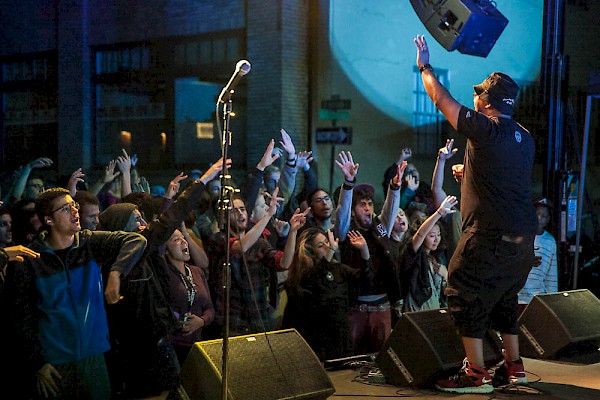 Cool Nutz at the free, all-ages, volunteer-run festival PDX Pop Now! in SE Portland on July 26, 2015—click to see more photos by Tojo AndrianarivoOne of the frequent arguments made against all-ages events is that they are not profitable because many venues rely heavily on bar sales. This seems especially true when talking about local music; however, this does not paint a full picture. Gresham-born hip-hop collective Trust No One Entertainment (TNO) hosts recurring, all-ages, hip-hop showcases at the Hawthorne Theatre that are not only entirely local bills, but also feature mostly under-21 rappers. These events have drawn hundreds of young Portlanders to the mid-sized southeast venue.
Cool Nutz at the free, all-ages, volunteer-run festival PDX Pop Now! in SE Portland on July 26, 2015—click to see more photos by Tojo AndrianarivoOne of the frequent arguments made against all-ages events is that they are not profitable because many venues rely heavily on bar sales. This seems especially true when talking about local music; however, this does not paint a full picture. Gresham-born hip-hop collective Trust No One Entertainment (TNO) hosts recurring, all-ages, hip-hop showcases at the Hawthorne Theatre that are not only entirely local bills, but also feature mostly under-21 rappers. These events have drawn hundreds of young Portlanders to the mid-sized southeast venue.
The behind-the-scenes work and planning rests largely on DeAndre Woods, 22, a former rapper turned show booker and manager of TNO artist DeRay Robinson (better known by his stage name D3). Woods has a warm smile and a youthful, charismatic demeanor, which is reflected in the shows that TNO puts together and his emphasis on promoting positivity for young people in his community.
“A lot of older guys aren’t positive about the all-ages situation, because they’re already stuck in their ways and you can’t really change that—you can just lead by example,” Woods says. “Hosting all-ages and benefit shows isn’t about who does it first; it’s about who does it right, because in reality it’s just going to benefit everybody in the community. I’m still going to promote all these younger cats, and ideally once they turn 21, they will know the value of having all-ages shows.”
TNO’s community outreach has gone beyond hosting all-ages hip-hop showcases—this past April, Woods hosted his second show at the Hawthorne Theatre in collaboration with DJ O.G. One (the Blazers’ official DJ) and local hip-hop legend Cool Nutz to collect resources for the Portland Rescue Mission. When I ask him if booking all-ages shows has made things more difficult, he shakes his head, as if the thought hasn’t crossed his mind.
“It’s an all-ages goldmine out here. People want to work with us because when they do everybody gets paid,” Woods says. And as he plans his future schedule of shows, the Hawthorne Theatre is looking forward to continuing their relationship. “As an all-ages club, it is great to work with someone who is young, eager and brings exciting all-ages shows into the club,” says Mike Thrasher Presents marketing manager Sarah Kinney.
“Everybody who wants to come out to a show should be able to,” Woods declares. “I’m not going to ever change the all-ages aspect because you want to drink and not be stuck in the back. That’s what the after-party is for.”
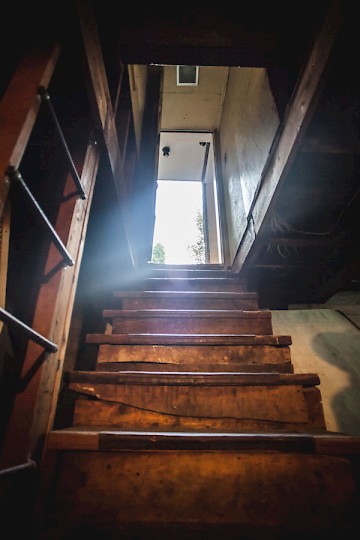 My Friend Ben Scott's House on June 9—click to see more photos by Sam GehrkeIt seems like this model is similar to Portland’s Good Cheer Records. The label often hosts two album release shows: the first all-ages and the second 21-plus at a bar. Perhaps this compromise is a necessary step forward. Then again, I think back to talking with Semi-OK and Motter, whose passions are contagious, asking myself if these things are at odds. In a certain capacity, yes, DIY is rooted in an opposition to capitalism, while 21-plus shows exist because of the capitalist interest of bar sales. But, I remember what Charlton said about this issue having more than one answer.
My Friend Ben Scott's House on June 9—click to see more photos by Sam GehrkeIt seems like this model is similar to Portland’s Good Cheer Records. The label often hosts two album release shows: the first all-ages and the second 21-plus at a bar. Perhaps this compromise is a necessary step forward. Then again, I think back to talking with Semi-OK and Motter, whose passions are contagious, asking myself if these things are at odds. In a certain capacity, yes, DIY is rooted in an opposition to capitalism, while 21-plus shows exist because of the capitalist interest of bar sales. But, I remember what Charlton said about this issue having more than one answer.
There are many young people trying to make, showcase and talk about their art in so many different and creative ways, and I don’t see that changing. If we want music lovers of all ages to be allowed access, a shift in priorities must happen. The conversation cannot end after one article or one show. These young organizers need to be continually supported by those who are older, with more experience and resources—an effort Friends of Noise appears to be making. When we book a show, we must make inclusivity a priority so that everyone can participate in local music. And yes, booking all-ages is more difficult, and it won’t stop being a struggle to do so. But all of these musicians, bookers and advocates have and will continue to persevere, together, while hopefully extending the invitation for more young people to come along.
Cameron Crowell is a founder of the zine Witch Haus PDX and a music contributor to the Portland Mercury—and he just turned 21.

